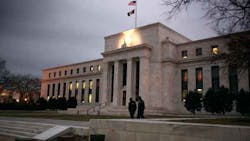Market Turmoil Poses New Challenge to Fed's Rate Plans
WASHINGTON—The turmoil sweeping through global markets has raised a new challenge to the Federal Reserve's plan to begin raising U.S. interest rates.
Widely expected just weeks ago to undertake the first rate hike in nine years in September, the Fed now must weigh the risk of pouring more oil on the flames in tumbling equity and commodities markets.
After major stock markets sank sharply again Monday, most analysts said they now expect the U.S. central bank to postpone yet again an increase of the benchmark federal funds rate, which has sat at zero since the 2008 crisis.
"With the plunge in global markets, I think it's unlikely that the Fed will raise rates in September -- perhaps about a 20% chance," said Stephen Oliner, an economist with the Washington think-tank American Enterprise Institute.
Oliner, a former 25-year veteran of the Fed, only last week put the chances of a September increase as even.
Fed Chair Janet Yellen's resolve to move ahead with the "normalization" of U.S. monetary policy, after six years in crisis stance, was already being questioned after recent US data showed still-weak inflation and few fresh signs of tightening in the labor markets -- both key triggers for the Fed's rate decisions.
The minutes to the July 28-29 meeting of the policy-setting Federal Open Market Committee, released last week, showed both a caution over still-low inflation and a concern over China's economic malaise.
Several participants in the meeting "noted that a material slowdown in Chinese economic activity could pose risks to the U.S. economic outlook."
Since that meeting, China's surprise devaluation of the yuan two weeks ago has sparked further turbulence in the global economy, spurring competitive devaluations and capital outflows in other emerging economies.
The devaluation only served to underscore another worry Fed policymakers voiced in the July meeting: that raising the fed funds rate would exacerbate the strength of the US dollar, "extending the downward pressure on commodity prices and the weakness in net exports."
Summers: Hike Now Dangerous
Yet the Fed's reasons for moving earlier rather than later are also strong. The zero-rate policy and its now-ended quantitative easing programs have injected trillions of dollars in cheap money into the global economy, they very thing that has helped fuel market bubbles like China's.
The Fed wants interest rates to better reflect the moderate pace of growth of the US economy. Instead, rates, especially short-term rates, look like those of an economy stalling.
In the past week, the yield on the five-year Treasury has tumbled from 1.6 percent to 1.29 percent early Monday, and the one-year note from 0.43 percent to 0.30 percent.
A rate rise, some argue, would be a strong first step to a more appropriate monetary stance, helping to avoid problems down the road.
Even so, former U.S. Treasury secretary Lawrence Summers said Monday in an opinion piece in the Financial Times that raising rates now would be a "serious error" that would threaten the Fed's major objectives -- price stability, full employment and financial stability.
Markets have already gone into a period of self-correction, Summers argued, so the Fed does not need to act on that.
"At this moment of fragility, raising rates risks tipping some part of the financial system into crisis, with unpredictable and dangerous results."
Markets, though, will not have to wait until the September 16-17 policy meeting for the central bank's views on monetary policy. The Fed holds its annual symposium in Jackson Hole, Wyoming, on Thursday and Friday. Yellen will be absent, but Vice Chair Stanley Fischer, a close Yellen ally who is not shy about making his views known, will preside over the meeting.
Copyright Agence France-Presse, 2015
